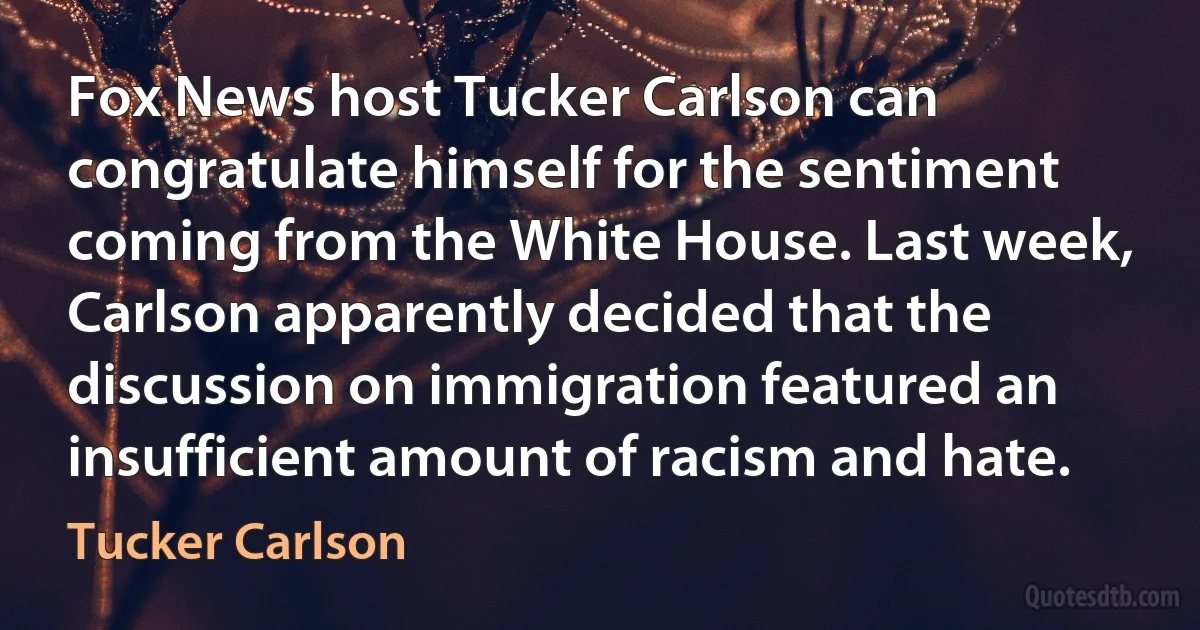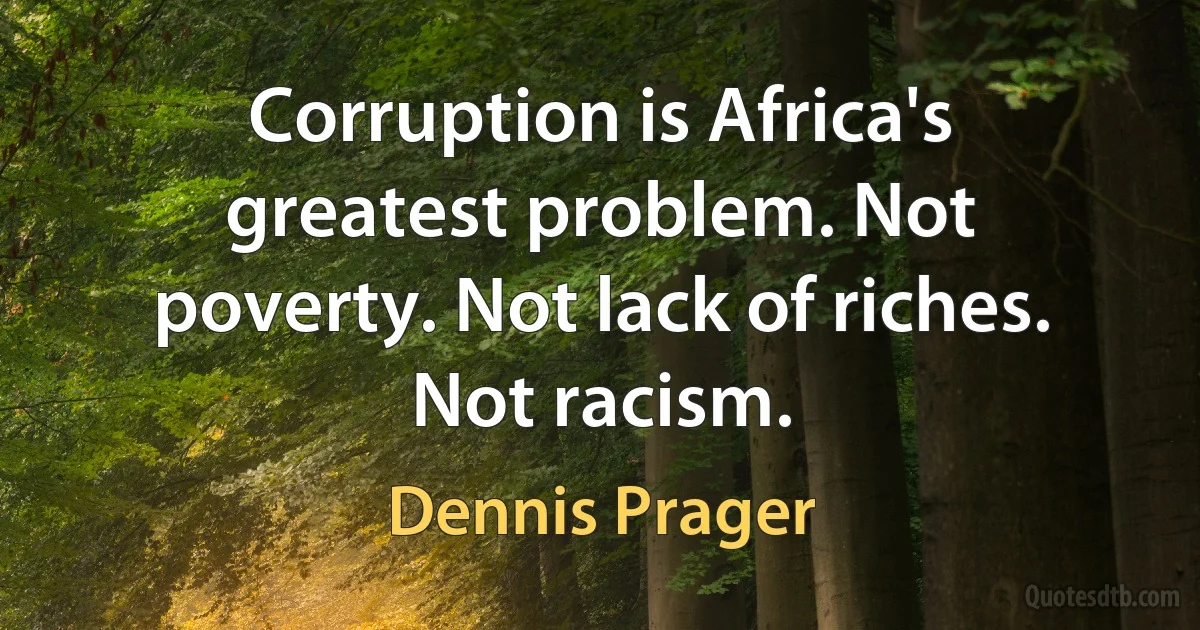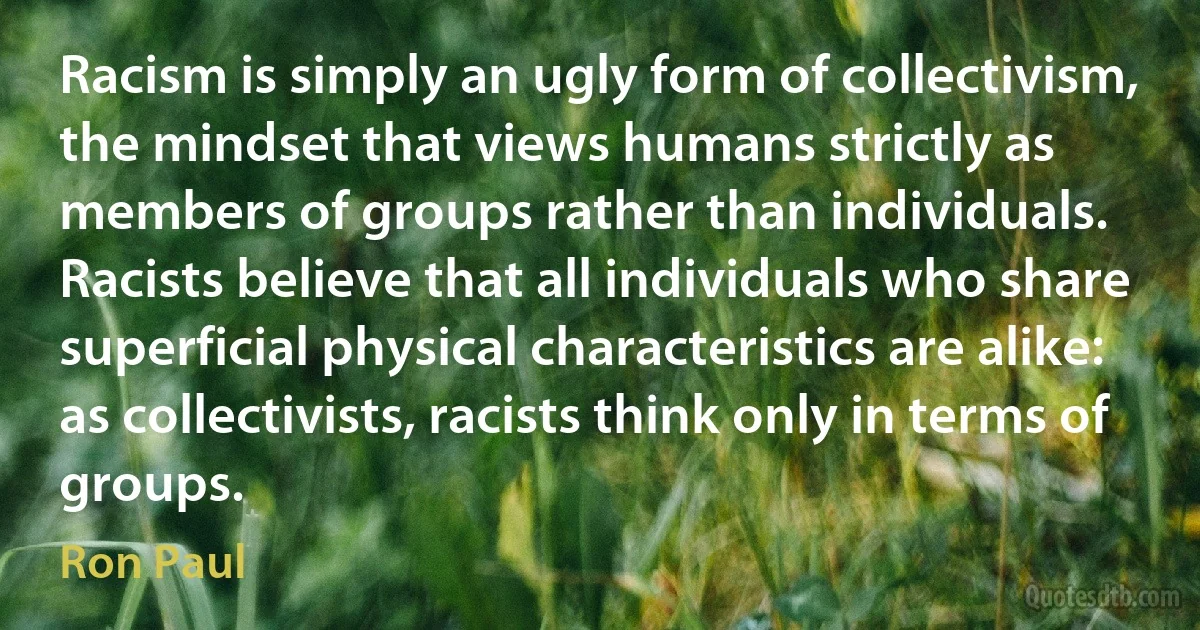Racism Quotes - page 19
First, weaken the black family, but don't blame it on individual choices. You have to preach that today's weak black family is a legacy of slavery, Jim Crow and racism. The truth is that black female-headed households were just 18 percent of households in 1950, as opposed to about 68 percent today. In fact, from 1890 to 1940, the black marriage rate was slightly higher than that of whites... In New York City, in 1925, 85 percent of black households were two-parent households... Disgustingly, black politicians, civil rights leaders, liberals and the president are talking nonsense about "having a conversation about race." That's beyond useless. Tell me how a conversation with white people is going to stop black predators from preying on blacks. How is such a conversation going to eliminate the 75 percent illegitimacy rate? What will such a conversation do about the breakdown of the black family... Only black people can solve our problems.

Walter E. Williams
There's a reason that we don't go into people's homes and tell them how to live. We may not know their problem, and what it's like, so how can we know the solution? We don't say to someone who is hurting 'I know what's wrong, and it's nothing, so you shouldn't complain or be bitter.'...
And finally, for those who are angry at people who are sad from suffering, and racism, and stereotypes and prejudices - this is their pain. It is ok that they have pain, and that they are dealing with it the way they need to, and the way we need to. If you are thinking of yourself, it won't make much sense, because it doesn't have anything to do with you. Think of them instead. And if you really want to see someone smile, and not suffer, think of a way that you can bring them joy.

Ysabella Brave
I think we in the mainstream media - especially cable television - sometimes bungled coverage of Trump. There was too much uncritical television coverage of Trump because he was good for ratings; then there was not enough investigation of his business dealings, racism and history of sexual assaults, and too much false equivalency that equated the two candidates as equally flawed. More broadly, we in the mainstream media are out of touch with working-class America; we spend too much time chatting up senators, and not enough visiting unemployed steel workers. Yet for all of our sins in the mainstream media, these alt-right websites are both far more pernicious and increasingly influential.

Nicholas D. Kristof
Early signs of what the Trump administration may look like: A man associated with white supremacy and misogyny will be White House chief strategist; a man rejected for a judgeship because of alleged racism will be attorney general; and an Islamophobe who has taken money from Moscow will be national security adviser. No, this is not satire.

Nicholas D. Kristof
The glory of this land has been its capacity for transcending the moral evils of our past. For example, the long struggle of minority citizens for equal rights, once a source of disunity and civil war, is now a point of pride for all Americans. We must never go back. There is no room for racism, anti-Semitism, or other forms of ethnic and racial hatred in this country.

Ronald Reagan
Americans recoiled from the repugnant spectacle of white supremacists marching in Charlottesville to promote their un-American "blood and soil” ideology. There is nothing in their hate-driven racism that can match the strength of a nation conceived in liberty and comprising 323 million souls of different origins and opinions who are equal under the law.

John McCain
A fundamental principle of the First Amendment is that all persons have access to places where they can speak and listen, and then, after reflection, speak and listen once more. The Court has sought to protect the right to speak in this spatial context. A basic rule, for example, is that a street or a park is a quintessential forum for the exercise of First Amendment rights. See Ward v. Rock Against Racism, 491 U. S. 781, 796 (1989). Even in the modern era, these places are still essential venues for public gatherings to celebrate some views, to protest others, or simply to learn and inquire.

Anthony Kennedy
These are white workers, neither rich nor poor, but angry over economic insecurity, unhappy with their work, worried about their neighborhoods, hostile to government-combining elements of racism with elements of class consciousness, contempt for the lower classes along with distrust for the elite, and thus open to solutions from any direction, right or left.

Howard Zinn
History has repeatedly illustrated the dire consequences of extreme social inequality. It foments revolutionary ferment, which can come from the left or the right. Either a leftwing populism that smashes oligarchic power takes control or its counterfeit, a rightwing populism, built on the poisoned solidarity of hate, racism, vengeance and violence - and bankrolled by the hated oligarchs that use it as a front to solidify tyranny. We are barreling towards the latter.

Chris Hedges
Racism is the lowest, most crudely primitive form of collectivism. It is the notion of ascribing moral, social or political significance to a man's genetic lineage-the notion that a man's intellectual and characterological traits are produced and transmitted by his internal body chemistry. Which means, in practice, that a man is to be judged, not by his own character and actions, but by the characters and actions of a collective of ancestors.

Ayn Rand
Mr. [Clyde] Ross at that time, like most African Americans around the country, was unable to secure a loan, due to policies around redlining and deciding, you know, who deserved the loans and who doesn't. There was a broad, broad consensus that African Americans, for no other reason besides blanket racism, could not be responsible homeowners.

Ta-Nehisi Coates
Even at school, we were, as I say, we were separated, and...and friends were Japanese. So, yeah, I think I considered myself Japanese more than Japanese American, though we would hear that we, we were citizens of this country, and so we had certain rights and so forth. But the parents were strangers, outsiders, and they had to kind of maneuver with the, the racism and pressure and so that, yeah, I felt more Japanese, I think.

Hiroshi Kashiwagi
The challenge of the twenty-first century is not to demand equal opportunity to participate in the machinery of oppression. Rather, it is to identify and dismantle those structures in which racism continues to be embedded. This is the only way the promise of freedom can be extended to masses of people.

Angela Davis



